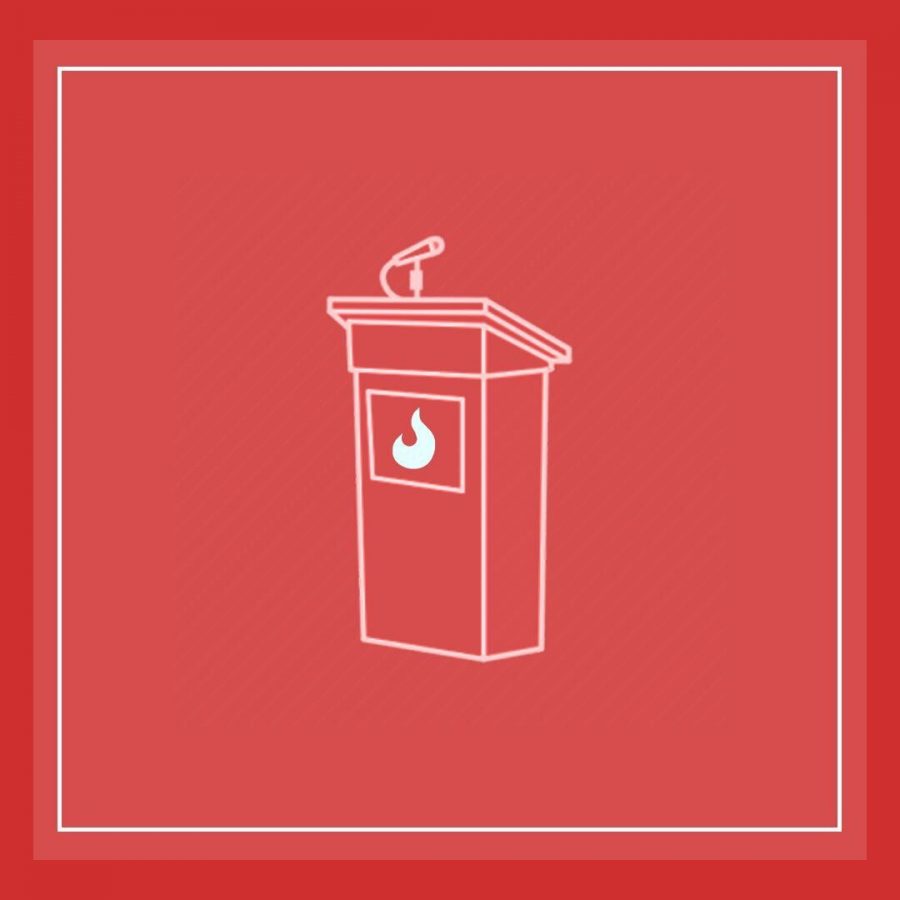On Sept. 29, Donald Trump and Joe Biden went head-to-head in Cleveland, Ohio, at the first presidential debate. The night consisted of name-calling, disruptions and the moderator, Chris Wallace of Fox News, struggling to maintain control. The President and former Vice President were asked questions about the coronavirus pandemic, the economy, the Supreme Court, racial injustice, their track records and the integrity of the election.
The debate has been called “90 minutes of chaos in a year of upheaval,” by the New York Times. Many Americans are undecided this election season and were relying on this debate as an opportunity to hear both sides of the playing field. Several St. John’s students interested in hearing the plans of both candidates felt this night was unproductive.
Christopher Aranibar, a senior and a first-time voter, found the debate to be ridiculous and felt that both candidates did a poor job of explaining their policies and what they intended to do as president. “All they did was attack each other and say irrelevant things. It didn’t inspire me, didn’t make me feel better about either candidate,” he said.
Another St. John’s student, Jayda Konakli, is also a first-time voter and has been following politics long before this election season. She said she is very excited to be voting for the first time this year, but agreed with Aranibar, calling the debate “a complete mess.”
“This debate was supposed to be presidential, they’re supposed to be representing the best of both sides of our country and I felt that their portrayal was very inaccurate,” she said.
When asked what moments stuck out to them the most, Aranibar reflected on the moment when Trump spoke about Biden’s son, Hunter Biden.
“Hunter got thrown out of the military. He was thrown out, dishonorably discharged for cocaine use,” Trump said during the debate. “And he didn’t have a job until you became vice president.”
“Trump calling out Biden’s son for being kicked out of the military, I thought it was rude and disrespectful. I don’t think it’s right to talk about family like that, especially on such a public stage. It was uncalled for,” Aranibar said.
Konakli agreed, stating that “Trump saying anything about Biden’s sons, I feel is kind of dirty. That shouldn’t be allowed in politics, Biden’s sons are not on the ballot. Families should have never been brought up, especially Hunter’s addiction issues.”
“I feel like that made Trump seem like a huge loss, especially as a psychology major. Mental health is very important. And when you see someone has an addiction problem, it becomes a mental health issue,” Konkali said. “Bringing that into politics and degrading someone for that nationally, that’s kind of an embarrassment to me.”
Aranibar and Konakli were both asked about what policies they were looking forward to hearing about during the debate. Their major concerns included climate change, the economy, the COVID-19 pandemic, women’s reproductive rights and the Black Lives Matter movement. They unanimously agreed that they felt that they did not hear enough on any of those things.
As for which candidate they felt won? Their opinions were quite the opposite.
“Trump did an exceptional job of appearing confident and better than Biden,” Aranibar said instantaneously. ”He interrupted him a lot and Biden seemed very frazzled as a result. Trump was able to get under Biden’s skin and I think a lot of people will recognize that.”
“I think Trump won because he did a good job of getting under Biden’s skin so well, whereas Biden spent the entire time attacking Trump instead of talking about his policies and trying to appear confident,” he continued.
Aranibar, defending his stance, said, “People can say what they want, that’s what I noticed.”
Konakli’s viewpoint was the opposite.
“I think they both did kind of poorly, to be honest,” she said.“It’s really hard for undecided voters when they’re just trying to hear out each candidate’s platforms. Both sides were disruptive and it just wasn’t what you really expect from a presidential candidate.”
“However,” Konkali said, “I do believe that Biden did a better job of getting his policies out there. I feel like I still don’t know much about what Trump is running on. I barely knew back in 2016.”
When asked who she believed won, she said with a disappointed tone, “I don’t think anyone won. Even the people watching at home. We all lost. All of America lost.”
As a result of each candidate’s performance, neither Aranibar nor Konakli feel informed as first-time voters headed for the polls this upcoming election.
“I did not get any information from either candidate, and that was the biggest problem with this debate. Neither candidate really put their foot down and answered the questions for the benefit of the American people,” Aranibar said.
Aranibar went on to explain why he may not vote for either candidate. “I think I might vote third party because they both did poorly,” he said. “However, I will say that Trump did a good job of answering questions without answering the questions, it’s something he is very good at.”
Konakli says she will most likely be casting her ballot for Biden this November.
“I don’t feel informed and I still don’t know what Trump is trying to accomplish,” she said. “He didn’t really talk too much about the platform he is running on and I would like to know more. I really didn’t get much out of Trump but I wish I did,” Konakli said.
“It’s really hard to vote third party in this election but I do think that Biden did a better job of answering questions to the best of his abilities,” Konkali continued. “I do know that he has a stutter disability, which might seem like it’s an issue, but I don’t think that type of a disability should hinder you from becoming President,” she said. “He did well as a Vice President for eight years. He helped the economy out of a recession. He answered most of the questions that were presented to him with poise and grace. He really tried not to get too much into the arguing.”
Both Aranibar and Konakli emphasized the importance of voting and what it means to exercise your right to vote.
“I 100% believe in the right to vote. If I don’t vote and share my opinion, then one of these candidates is going to be elected,” Aranibar passionately stated. “Third parties should have more impact on the outcome of elections because neither of these candidates are fit for the presidency. It makes me want to vote because something needs to change.”
Konakli also gave a powerful statement. “It’s so necessary to use your right to vote,” she said. “If you don’t exercise your right to vote, it’s extremely hard for accurate representation even on the local level. You obviously want to live in a place that is made for you, that caters to you. The point of the government is to help you, not you help the government.”
“It’s the government that is supposed to be there for you and provide you with things that help you as a community, not just you specifically as an individual, but everyone in the community should be able to be accurately reflected in who they vote for,” she continued.
Both students have set the tone for what many other Americans, including fellow college students and first-time voters, may be thinking all across the country. The first presidential debate of the 2020 election season may have been “chaotic” and “childish” according to many news outlets across the globe, but it could also speak volumes to who we elected president four years ago and to whom we may potentially elect in November.








